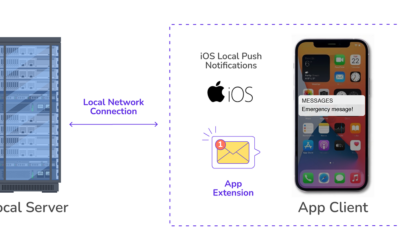Table of Content
Create innovative apps with iOS 18 for the latest advancements in mobile user experience, including virtual reality and machine learning capabilities. Krasamo is an innovative mobile app development company with more than 15 years of experience in working with iOS app development.
iOS App Development Updates
The world of iOS app development is evolving rapidly, and Krasamo is at the forefront, working on the latest advancements to deliver innovative mobile solutions. With Apple’s ongoing commitment to pushing technological boundaries, iOS offers developers exceptional tools and capabilities to create intelligent, engaging, and secure apps.
Apple’s recent updates emphasize deeper integration with Apple Intelligence, enabling apps to leverage features like Siri-driven actions and on-device AI and machine learning models. This empowers apps to deliver experiences beyond expectations—rewriting text, summarizing content, and generating playful images or personalized emojis. App Intents have expanded to support hundreds of new Siri actions and APIs that make app entities more dynamic and meaningful across the platform.
Beyond intelligence, Apple continues to elevate the user experience with enhancements like a redesigned tab bar for intuitive navigation and seamless integration with Control Center and the Lock Screen, making apps more accessible and engaging. Security innovations like streamlined passkey creation ensure developers and users benefit from a safe and hassle-free environment.
At Krasamo, we leverage these advancements to develop native iOS apps tailored to your business needs. We blend creativity and technology to ensure your app stands out in the competitive mobile landscape. Whether you’re looking to modernize your apps or create a new one from scratch, Krasamo is your trusted partner in turning ideas into impactful iOS experiences.
Develop for iOS 18
New Features in iOS 18
iOS 18 introduces a transformative set of capabilities that enhance both developer productivity and user experience. At the heart of this release is Apple Intelligence, a sophisticated system that integrates powerful generative AI capabilities directly into the core of iOS devices. This new technology enables developers to create more intuitive and responsive applications that can understand and adapt to user needs in real-time.
The platform introduces enhanced Writing Tools, allowing applications to offer advanced text manipulation features. These tools enable seamless text rewriting, proofreading, and summarization capabilities, making applications more powerful for content creation and editing tasks. Additionally, the new Image Playground API provides developers with tools to implement creative image generation features, allowing users to create playful and contextual visuals directly within applications without requiring external services.
App Intents have been significantly expanded in iOS 18, offering deeper integration with Siri and system-wide features. This update allows applications to expose hundreds of new actions to Siri, making app functionality more accessible through voice commands and system interactions. The new framework also improves how apps can surface their features throughout the operating system, from Spotlight search to Control Center.
For user interface development, iOS 18 brings refinements to both SwiftUI and UIKit. The update includes improved Lock Screen and Control Center integration controls, making it easier for developers to create widgets and interactive elements that feel native to the system. The platform also introduces customization options for app icons and widgets, supporting Light, Dark, and Tinted modes to ensure consistent visibility across different system appearances.
In the security and privacy domain, iOS 18 introduces enhanced passkey support, offering a more streamlined and secure alternative to traditional passwords. The system now provides improved APIs for automatic passkey creation and upgrade paths, reducing friction in user authentication while maintaining robust security standards.
Machine learning capabilities have been significantly enhanced with updates to Core ML, offering more efficient processing of on-device AI models. The framework now supports more granular weight compression techniques and improved model management, enabling developers to implement more sophisticated AI features while maintaining optimal app performance.
RealityKit 4 debuts with this release, bringing a unified development approach across iPhone, iPad, Mac, and Apple Vision Pro. This update introduces advanced features for spatial computing, including improved 3D rendering capabilities, enhanced material systems, and new tools for creating immersive experiences.
These advancements in iOS 18 reflect Apple’s commitment to providing developers with powerful tools for creating innovative, intelligent, and secure applications while focusing on privacy and user experience.
Programming Languages
Swift
Swift, Apple’s powerful general-purpose programming language, celebrates its 10th anniversary since its WWDC 2014 announcement. Initially designed for Apple platforms, Swift has evolved into a truly cross-platform language now running on Linux, Windows, and beyond. The language combines modern features, strong safety guarantees, and exceptional performance with an approachable syntax that makes it accessible to developers of all skill levels.
As an open-source project under the Apache 2.0 license, Swift is transitioning to github.com/swiftlang to support its expanding ecosystem, with its evolution guided by multiple steering groups and workgroups that ensure it meets diverse developer needs.
Swift 6 introduces several groundbreaking features that enhance the language’s capabilities. It implements data-race safety by default, preventing concurrent programming issues at compile-time, and introduces Embedded Swift, a specialized subset for highly constrained systems that maintains safety guarantees while producing compact binaries. The release also expands bidirectional C++ interoperability, supporting virtual methods, default arguments, and move-only types, while adding typed throws for improved error handling and performance.
The development experience is streamlined through comprehensive tooling support. Swift integrates seamlessly with Xcode, providing robust debugging and profiling capabilities. The Swift Package Manager offers efficient dependency management and build systems, while SourceKit-LSP enables development across various editors including VSCode, Neovim, and Emacs, making Swift development truly accessible across platforms and toolchains.
Objective-C
Objective-C was Apple’s primary programming language until Swift succeeded it in 2014. Objective-C is a superset of the C, which has a general purpose with object-oriented capabilities. Objective-C files can coexist with Swift in a project. You can Import APIs, use runtime features, or migrate code into Swift.
Krasamo developers can modernize your Objective-C codebase and migrate to Swift by gradually replacing pieces and avoiding rewriting the entire code. Migrate code by classes and replace them with Swift files, ensuring you understand how Swift translates Objective-C features. Also, keep a close eye on the native Swift syntax, customize interactions with Objective-C APIs (macros, selectors, paths), add nullability to control declarations, language interoperability, handling methods, objects, types, functions, etc.
Developer Tools and Resources
SwiftUI
SwiftUI represents a significant advancement in Apple’s development ecosystem, transforming how teams build and maintain user interfaces across Apple platforms. The framework’s declarative approach allows developers to create sophisticated interfaces with surprisingly minimal code, while ensuring consistency across iPhone, iPad, Mac, and Vision Pro devices.
Recent enhancements in 2024 to SwiftUI have focused on improving developer productivity through advanced design tools and live previews, enabling immediate visualization of changes during development. The framework now offers enhanced interoperability with UIKit and AppKit, making it practical for teams to gradually adopt SwiftUI in existing projects without requiring complete rewrites. This iterative adoption capability, combined with built-in support for essential features like dark mode, accessibility, and localization, makes SwiftUI particularly attractive for product teams looking to optimize development resources while maintaining high-quality user experiences.
The framework’s efficiency in handling animations and gestures with minimal code, along with its robust previewing capabilities that support testing across different devices and configurations, translates to faster development cycles and reduced maintenance costs. For product teams, this means more agile development processes, quicker feature deployment, and more efficient resource utilization across platform-specific development efforts.
Xcode 16
Xcode is Apple’s Integrated Development Environment (IDE) to build and test iOS apps in macOS, iOS, iPadOS, watchOS, and tvOS platforms that provide a unified SDK and continuous integration and delivery (CI/CD) system. Xcode 16 introduces enhanced preview capabilities and improved performance profiling tools. The IDE manages workflow and pull requests and supports integration with code platform solutions such as GitHub, Bitbucket, and Gitlab for version control features.
Xcode includes all of the tools, frameworks, and compilers required to develop your mobile application, with enhanced support for the latest iOS 18 features, including Apple Intelligence integration and advanced machine learning capabilities.
Xcode Cloud
Xcode Cloud is directly integrated into Xcode, providing a powerful cloud-based solution for building and delivering apps with reduced infrastructure requirements. The platform offers automated workflows and delivers instant results, with comprehensive reports available in Xcode immediately after builds and tests. Its parallel testing capabilities significantly accelerate the development process, while seamless TestFlight integration streamlines beta testing. The platform’s robust security features ensure code and data protection throughout the development lifecycle, making it an essential tool for efficient iOS app development.
Test Flight
TestFlight serves as Apple’s official beta testing platform, integrated with the iOS development ecosystem to facilitate comprehensive app testing before App Store release. The platform enables developers to distribute test versions to both internal team members (up to 100 testers) and external users (up to 10,000 testers), with builds remaining active for 90 days.
TestFlight is a crucial tool in iOS app development, offering comprehensive testing capabilities through organized workflows, automated distribution, and extensive platform support. The platform enables teams to collect structured feedback through crash reports and annotated screenshots while providing insights into app performance and user engagement metrics. Its seamless integration with Xcode Cloud and App Store Connect streamlines the development process from testing to deployment. With support for both internal testing teams and external beta users via public links, TestFlight facilitates thorough app validation before release while maintaining controlled distribution and privacy-focused feedback collection.
Krasamo’s experienced development team builds iOS applications with Core ML integration, implementing custom machine learning models and advanced workflows tailored to specific business needs.
iOS SDK Key Technologies
SharePlay for Developers
Integrate the app into Facetime and share media to other spaces and playback simultaneously on the other devices. If the other users don’t have your app installed, SharePlay will guide them to download it. Also allow to run apps on other Apple platforms as a Universal Purchase.
Focus and Notifications
Communicate important information to your users by generating user-facing notifications from your app (local) or from a managed server (remote). Local notifications triggers delivery by the apps for certain triggered conditions. For remote notifications use Apple push notification service (APN).
ARKit
Create Augmented reality (AR) experiences for specific cities and landmark locations anchored to geographic coordinates. Also, supporting improved motion tracking and face tracking features extended to the front-facing camera. Other AR features enable placing virtual objects in their physical surroundings and detection features.
RealityKit
Develop AR-rich apps that blend virtual content with the real world with many object elements, better effects, more functionality, and better control of the AR scenario and assets. In addition, detection features allow virtual objects interactions with physical surroundings and simulations.
Create ML
Using on-device input or behavior for training and creating Machine Learning models. Use an app interface with a Mac and connect external graphics processing units (GPU)to improve performance. Choose from several model types: image, text, video, sound, motion, and tabular. Create ML is available as a Swift framework.
GameKit
GameKit is a framework for developing and implementing features once Game Center (Apple game service) enables players that have been identified and authenticated to interact in real-time with multiple players and offers many features to enhance the user experience as leaderboards, achievements, friend lists, etc.
Game Controller
Game Controller is a framework that adds game controller capabilities in Xcode to support users, including products such as Xbox, DualShock 4, and DualSense. It also gives support to the keyboard, mouse, and Siri. Build code to process input and access it by supported profiles, register physical objects and display virtual controllers.
StoreKit 2
StoreKit 2 is a framework that facilitates in-app purchases across Apple platforms using the App Store account using an advanced Swift-based API. StoreKit 2 ensures timely information of transactions, subscription status, offers, and more. Secure and reliable with integration with Touch ID and Face ID.
Safari Web Extensions
Create Safari web extensions for customizing and enhancing browser functionality using HTML, CSS, and JavaScript. Use Xcode to repackage extensions to work with other browsers and provide a secure distribution through the App Store and usage model by implementing them as iOS or macOS.
ShazamKit
ShazamKit is a framework for audio recognition that finds an audio match using an acoustic signature that captures the audio signal and generates and stores a reference signature with metadata. A query signature matches the catalog of reference signatures captured, creating functionality for music recognition and virtual learning products.
MusicKit
MusicKit framework for integrating Apple music into your app or website. Your app can fetch music from the Apple Music catalog using a request feature, allowing filters to load items, work with music attributes and notification messages, set value types, and playback support.
Healthkit
The HealthKit framework allows you to access and share data with your app, acting as a central repository of data. Your app can use HealthKit features and focus on custom features, giving users the freedom to pick any device and centralize information from various apps.
HomeKit
HomeKit is a framework that allows to use your app to connect smart home automation accessories. HomeKit provides a user-focused interface to coordinate and control accessories. Enabling HomeKit in your app provides seamless connectivity with Matter accessories and third-party home hubs.
CloudKit
CloudKit is a framework that stores app and user data in iCloud and synchronizes across devices and platforms. Apps are organized in containers that include databases and siloed app data, information separated by access type or function, and encryption and privacy protection.
EventKit
EventKit framework lets you add calendar and reminders to your app, set up alarms, recurring events, and notifications integrated with the user’s events. Your app accesses the users’ calendar events and supports the creation of new events.
Krasamo’s iOS Development Services
As a specialized iOS app development company, Krasamo provides crucial value to enterprises through technical expertise, development efficiency, quality assurance, and long-term support.
Technical Implementation
- Swift and SwiftUI expertise for native iOS development
- Integration of Apple Intelligence and machine learning capabilities
- Implementation of enterprise-grade security protocols
Development & Deployment
- Efficient development lifecycle
- Cross-platform optimization for all Apple devices
- Automated testing and streamlined deployment processes
Enterprise Solutions
- Custom business solutions using iOS frameworks
- Secure enterprise apps with advanced authentication
- Integration with existing enterprise systems
- Optimized experiences for both internal and customer-facing apps
Quality & Compliance
- Rigorous testing across device ecosystem
- Performance optimization and monitoring
- App Store and enterprise security compliance
- Comprehensive documentation
Ongoing Partnership
- Regular platform compatibility updates
- Integration of new iOS capabilities
- Continuous technical support and maintenance












